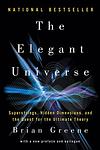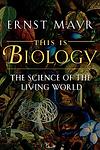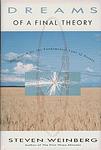A Science Canon (Ian McEwan)
This is one of the 291 lists we use to generate our main The Greatest Books list.
-
Advancement Of Learning by Francis Bacon
"Advancement of Learning" is a philosophical treatise that explores the limitations and advancements in various fields of learning and knowledge. The work advocates for the empirical approach to scientific inquiry, emphasizing observation and experimentation as the core methods for gaining true understanding. The author critiques the prevailing scholastic education system, which he finds overly reliant on tradition and the authority of ancient texts. He proposes a new methodological framework for learning, which later influenced the development of the scientific method. This treatise is a foundational text in the philosophy of science, promoting the idea that knowledge should progress through inductive reasoning and the systematic collection of facts.
-
The Feeling Of What Happens by Antonio Damasio
This book delves into the complex interplay between emotion, consciousness, and the human brain, offering a groundbreaking perspective on how our feelings shape our experiences of the world. The author, a renowned neuroscientist, explores the biological roots of consciousness and argues that our emotions are a crucial component of the self, playing a fundamental role in the way we perceive and navigate our surroundings. Through a combination of scientific research and philosophical inquiry, the text provides a compelling examination of the essence of human awareness, suggesting that the feeling of what happens in our minds is central to our identity and understanding of life.
-
The Expression Of The Emotions In Man And Animals by Charles Darwin
The book explores the biological aspects of emotional life across humans and animals, arguing that emotions are evolutionary adaptations that have enabled species to survive and thrive. The author examines various emotions, such as anger, fear, and joy, and discusses how they are expressed in both humans and animals through similar physical signs. By using a wide range of examples and meticulous observations, the work highlights the universality and evolutionary significance of emotional expression, suggesting that certain emotional responses are innate and universal across different species.
-
The Selfish Gene by Richard Dawkins
This groundbreaking book presents a revolutionary perspective on the theory of natural selection. The author argues that genes, rather than individuals or species, are the true units of evolution. He suggests that these 'selfish' genes are driven by their own survival, leading to complex behaviors and characteristics in the organisms they inhabit. This work reframes our understanding of evolution, emphasizing the gene's role in shaping biological life and behavior.
-
The Fabric Of Reality by David Deutsch
This book presents a groundbreaking exploration of the nature of reality, intertwining multiple disciplines such as quantum physics, evolution, computation, and epistemology. The author proposes an integrated understanding of the universe, arguing that these seemingly disparate fields are deeply connected and that our reality is shaped by the complex interplay of their fundamental principles. By challenging conventional views and introducing the concept of the multiverse, the work invites readers to reconsider the structure of the world as we know it, advocating for a more comprehensive perspective on existence and our place within it. Through rigorous scientific analysis and philosophical inquiry, it offers a compelling vision of a unified fabric of reality, where the mysteries of the cosmos and human knowledge converge.
-
Guns, Germs, and Steel by Jared Diamond
The book is a comprehensive exploration of the different trajectories of human societies throughout history. It argues that environmental factors, rather than racial or cultural differences, are the primary reason why some societies developed more advanced technology and political systems. The author uses a multidisciplinary approach, drawing from fields such as geography, evolutionary biology, and linguistics, to support his thesis. The book covers a wide range of topics, including the domestication of plants and animals, the invention of writing, and the spread of diseases.
-
Dialogue Concerning the Two Chief World Systems by Galileo
This scientific work presents a series of discussions between three characters, each representing a different perspective on the cosmological theories of the time. Throughout the dialogue, the characters debate the merits of the Ptolemaic geocentric system, which asserts that the Earth is the center of the universe, and the Copernican heliocentric system, which proposes that the Sun is the center. The author uses these discussions to subtly argue in favor of the Copernican system, challenging the traditional religious and scientific beliefs of his time.
-
The Elegant Universe by Brian Greene
"The Elegant Universe" by Brian Greene is a captivating exploration of the fundamental principles of physics, delving into the intricate world of string theory and its potential to unify the laws of the universe. Through vivid explanations and thought-provoking analogies, Greene takes readers on a journey from the early discoveries of Newton and Einstein to the cutting-edge theories of quantum mechanics and relativity. With a blend of scientific rigor and accessible language, the book offers a compelling narrative that challenges our understanding of space, time, and the nature of reality itself.
-
A Treatise of Human Nature by David Hume
This philosophical work delves into the understanding of human nature, focusing on the mind, emotions, and morality. The author argues that all of our thoughts and ideas are derived from our senses and experiences, rejecting the idea of innate ideas. He also debates the nature of causality, the existence of the self, and the basis of moral judgments. The work is a comprehensive exploration of empiricism, skepticism, and naturalism.
-
This Is Biology by Ernst Mayr
"This Is Biology" explores the essence and implications of biology, emphasizing its status as both a science and a key lens through which to examine the world. The book delves into the history and scope of biological study, addressing how life is defined, the evolution of species, and the complex interactions within ecosystems. It also discusses the impact of biology on society, including ethical considerations in genetic research and the role of biology in solving global issues such as environmental degradation and health challenges. Through this comprehensive overview, the book underscores biology's integral role in understanding both the natural world and human existence.
-
The Language Instinct by Steven Pinker
The book explores the idea that humans are born with an innate capacity for language. It argues that the ability to learn language is a natural instinct, hard-wired into our brains by evolution. Drawing from research in various fields including linguistics, psychology, and anthropology, the book examines how children learn language, how languages develop and change over time, and how the mind constructs and understands language. The author challenges the notion that language is a cultural artifact and instead presents it as a biological adaptation that is essential for human survival and communication.
-
Nature Via Nurture by Matt Ridley
The book explores the complex interplay between genetics and environment in shaping human behavior and traits. It challenges the traditional dichotomy of nature versus nurture, arguing that genes are not just blueprints that determine who we become without influence from our surroundings. Instead, genes and environment interact dynamically throughout a person's life. The author uses a range of scientific studies and real-life examples to illustrate how genes can be influenced and expressed differently depending on environmental factors. This synthesis of genetic science and psychology offers a more nuanced understanding of human development and the biological underpinnings of our behavior.
-
Letters On England by Voltaire
The book is a series of essays written in the form of letters that offer a critical examination of various aspects of English society, including its politics, religion, and culture, during the early 18th century. The author, a prominent Enlightenment thinker, contrasts the relative freedom and tolerance he observes in England with the more rigid and hierarchical society of his native country. Through his observations, he praises the English constitutional monarchy, the country's scientific achievements, and its respect for individual liberties, while also reflecting on the nature of trade, the role of the press, and the philosophies of notable English figures. The work is notable for its advocacy of religious tolerance and freedom of thought, and it played a significant role in promoting English ideas to a Continental audience.
-
Dreams Of A Final Theory (Radius Books) by Steven Weinberg
This book delves into the quest for a unified theory of the fundamental forces of nature, a pursuit that has captivated physicists for decades. The author, a Nobel laureate, shares his insights and experiences in the forefront of theoretical physics, exploring both the triumphs and challenges of the field. He discusses the elegance and complexity of the universe, from the smallest particles to the vast cosmos, and the ongoing efforts to discover a "final theory" that can explain all physical phenomena with a single, coherent framework. The narrative not only sheds light on the scientific process and the nature of discovery but also reflects on the philosophical implications of understanding the universe's ultimate laws.
-
The Diversity of Life by Edward O. Wilson
This book is a comprehensive exploration of the variety and richness of life on Earth, written by a renowned biologist. It delves into the concept of biodiversity, examining its importance and the threats it faces. The author discusses the evolution and extinction of species, the complex interactions within ecosystems, and human impact on the environment. The book is a passionate plea for the conservation of the planet's diverse species and ecosystems.
The Guardian, 15 Books
Thirty years ago, Richard Dawkins published his groundbreaking book The Selfish Gene. Ian McEwan argues that it is part of a long history of literary science writing, in which the pursuit of truth and the excitement of new ideas is conveyed in luminous prose
Added 14 days ago.
This list has a weight of 15%. To learn more about what this means please visit the Rankings page.
Here is a list of what is decreasing the importance of this list:
- Voters: 1 person voted
- List: only covers 1 specific genre
If you think this is incorrect please e-mail us at [email protected].














